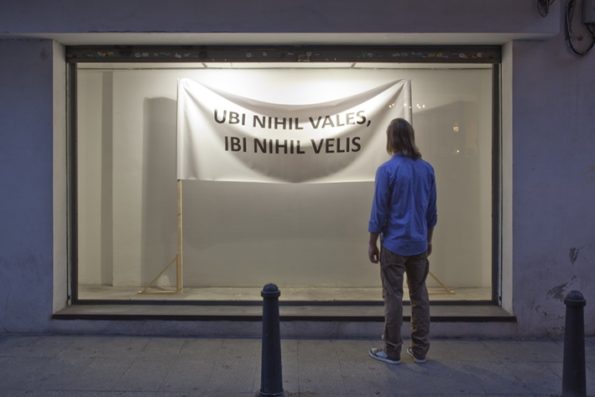Search
To search for an exact match, type the word or phrase you want in quotation marks.
A*DESK has been offering since 2002 contents about criticism and contemporary art. A*DESK has become consolidated thanks to all those who have believed in the project, all those who have followed us, debating, participating and collaborating. Many people have collaborated with A*DESK, and continue to do so. Their efforts, knowledge and belief in the project are what make it grow internationally. At A*DESK we have also generated work for over one hundred professionals in culture, from small collaborations with reviews and classes, to more prolonged and intense collaborations.
At A*DESK we believe in the need for free and universal access to culture and knowledge. We want to carry on being independent, remaining open to more ideas and opinions. If you believe in A*DESK, we need your backing to be able to continue. You can now participate in the project by supporting it. You can choose how much you want to contribute to the project.
You can decide how much you want to bring to the project.

Way too much instruction manual. Nowadays the code of a user programme seems to be the perfect functional language to apply to any occasion. In the instruction book we have perfect literature and a happy tool that saves us from anxiety, ravings or even social exclusion. Even something as rootless as utopia can occur in the form of a self-help breviary that indicates the ways to use the revolution or organise its liturgy. Worrying, without a doubt. We have routinized utopia as an ideological pamphlet at the service of any common destination, without questioning its true capacity for transformation, as the inexcusable bearer of radical and positive change always pirouetting between the real and the desired. Utopia throughout our most recent past, in becoming legitimate has lost the pleasure of discovery and has become converted into an almost mechanical ideology that applies prescriptions that only function a priori. However, utopia is like the sirens’ song in Ulysses travels, more worrying due to the silence of navigation than for its loaded melody.
Renouncing utopia as a user manual, but not utopianism as ethical thought, the work of Xavier Arenós revolves around the archaeological spaces of modernity discovering the inert remains of the utopias of the 20th century; plans for action and the social processes for an ideal State. Excavating in the subsoil of our memory or confined to the warrens of self-exile, the productions of this artist are like the stratigraphic workings of a mole. The works are artefacts and documentary records that propose a more efficient and less instrumentalized reading of utopian thought, that function as discursive structures that settle one on top of each other. I believe that his works allow us to know something more about what has been learnt and used because they possess the aesthetic option of being extraordinary material to read about the workers movements, the history of social architecture, the episodes silenced by the dictatorship, the wars or the anarchistic imaginary. An opportunity that is entirely relevant, narrating the proto-history of the failure of our current economic and social system.
The artist investigates without an instruction manual, indicating in the process of the pieces a pathway with which to return and read about the thought and utopias of the West, to analyse the desire for a material and moral bettering of society. In the end, utopias are models of hope for a more just future, one that we have not achieved. The work of Arenós is solid and coherent and has in the figure of the poet Hölderlin and his experience of a whole life in voluntary exile the silence of the emblematic force of dystopia.
In the gallery Valle Ortí in Valencia he has just presented a group of projects that link to form an open narrative about the symbolic constructions of modernity and its decline. The title of the project, Ubi nihil vales, ibi nihil velis (“where you are worth nothing, you will wish for nothing “, 2012), is an aphorism that alludes to the philosopher of Flemish origin Arnold Geulincx, a determinist and Calvinist who affirmed that the human being is a mere spectator of his acts, subject to the will of God. The artist reminds us that this instruction was also used on various occasions by Beckett to accentuate rootlessness, the sterility of language and the impotence of action as a radical behaviour of its imaginary, always in the ambivalence of the void. In the gallery window, a cloth banner expands the slogan of this headline as a warning against the struggle and also the defeat.
Amongst the works exhibited, some of which are earlier productions, such as that of the Canòdrom in Barcelona (Arquitectura desplazada, (Displaced architecture, 2010), I want to highlight the pieces dedicated to one of the most emblematic Russian Suprematists, El Lissitzky and his project Proun. The Soviet artist applied the term Proun (1919-1925) to a series of drawings, paintings and constructions designating in this way an imaginary and radical space, beyond any aesthetic or even functionalist category. Once more Xavier Arenós excavates in the words to observe in them the desire to communicate a transforming potential for art and politics. The piece Madriguera #9. Proun (2012) eis a reinterpretation of the composition Proun nº10, transforming the original piece to convert it into a hollow construction that assembles tunnels which function as sound boxes for the hypothetical communication between a transmitter and a receiver. This artefact is a heterochronic space where the echo of the past coexists with the voices of the present, with the argument of the whole series dedicated to the Prouns reaching its maximum visibility in the photographs of an excavation and simulacrum of the discovery of an archaeological object that resembles a strange city. The constructions, like the remains, continue to reflect upon utopian models of the past. Between the enigmatic Prouns, four books furthering social rights published by Ruedo Ibérico (in the El viejo Topo collection) are ordered into a geometric form on the wall, in the form of a new insignia of libertarian thought. The design of the covers, minimalist in style, is transformed within the space into a large mural painting. The whole exhibition brings together a potent stockpile of the reality of utopian thought, an inherent experience of human beings and their struggle against resignation.
The works by Xavier Arenós don’t describe history nor do they justify it, they are records that by their very nature traverse and confuse the values that guide the thought of modernity, as the only possible way to understand the world and to carry on anticipating utopia.

Pilar Bonet Julve is a researcher and teacher. She has a degree in Medieval History and a PhD in Art History from the UB, where she teaches contemporary art and design, art criticism and curating. She is interested in the overflowing and political spaces of art, she is not motivated by heraldic criticism or the vase exhibition. A specialist in the life and work of the Catalan medium and artist Josefa Tolrà, she follows in the footsteps of visionary women as an experience of new humanity. She has recently presented exhibitions on irregular creativity: Josefa Tolrà and Julia Aguilar, Les Bernardes de Salt; ALMA. Médiums i Visionàries, Es Baluard Museum, Palma; La médium i el poeta. An astral conversation between Josefa Tolrà and Joan Brossa, Fundació Brossa. Writing and editing pacifies his soul. She manages the research group Visionary Women Art [V¬W].
www.josefatolra.org
@visionarywomenart
@josefatolra
@pilarbonetjulve
@artscoming
"A desk is a dangerous place from which to watch the world" (John Le Carré)